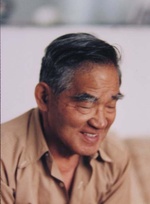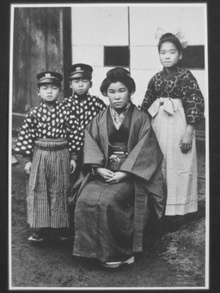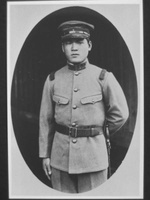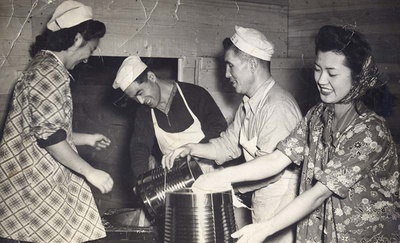My name is Natalie Mariko Sheldrake. I am a Sansei of Japanese and English descent. My family has recently come across an autobiography that was written by my grandfather (Ojiichan) and we it had translated into English so that we could all read it.
Matsunosuke Shibuya’s autobiography immediately made me want to find out more about my grandparents’ lives and more about Japanese-Canadian history, as this is something that I think should be talked about more and certainly not forgotten.
My mother, Betty (nee Tatsumi Betty Shibuya), 63 years old, was born in the internment camp at Tashme, British Columbia. This has always intrigued me—my mother was so young while she was there and does not remember much of that time. Some of her older siblings remember moments in the camp. My eldest aunt Machiko, 71 years old, who now lives in Lexington, Kentucky, remembers some fond moments…“On warm days we used to have ‘concerts and story time’ on Ojiichan and Obaachan’s bed. Both Ojiichan and Obaachan had lovely singing voices and they taught us many songs. He made a huge slide one winter when there was a heavy snowfall. He made steps on one side of the house and the slide went from the roof to the ground. He helped Obaachan, Chiye, with the washing of clothes.”
She said, “He worked hard to make sure that we did not want for anything. He was a great father and a husband. He was very strict about doing things properly and being kind to one another. He was naturally very athletic and was often asked to join in the baseball game but we children didn’t like him to go away from us. He usually stayed with us.”
“He loved parties and the occasional drink, telling stories, hearing new things and singing. We used to have several bachelors who would come to visit at the house in Tashme and they would spend a lot of time talking. I think Ojii-chan was interested in what was going on but he always thought of the family first. I think that is why he did not get involved in matters of politics.”
My grandfather was a very special man—in fact, some people in my family describe him as “not your typical Japanese man of his time”, since he did not have any problems with helping Obaachan with chores around the house such as cleaning and changing diapers. He always tried to make the best of every situation and tried to provide the best life he could for his wife and children. He was very thoughtful and selfless and was truly an inspiration, always demonstrating hard work and responsibility for his family. My mother and her siblings describe Ojiichan as extremely generous and that he would literally give someone the shirt off his back.
Ojiichan wrote his autobiography in 1986. He was 80 years old then. It was interesting to read that he described his life as having three distinct phases. It started with him as a young boy and man in Japan, to him finding Christianity in Canada and later finding himself and a family that would complete him. I cannot help but focus on the latter part of his life that is briefly mentioned at the end—the part of his life where he marries Chiye and begin their family that grew to include 7 children (Machiko, now 71, Sayoko, 70, Yumiko, 68, Douglas Kyohei, 65, Betty Tatsumi, 63, Arthur Tsukasa, 61 and Sally Itsuko, 59) and 8 grandchildren. Even though this last paragraph is short, it left me in tears. I never heard Ojiichan speak in such a way—as far as I knew, Ojiichan was generally quiet and it was really emotional for me to read about him having the feelings of being “happy” and “grateful”.
There was also a fourth phase in Ojii-chan’s life which is not mentioned in his autobiography—Obaachan and Ojiichan moved from Winnipeg, Manitoba to Brampton, Ontario in 1999. They made this move as they were getting older and things were becoming more difficult to manage on their own. Fortunately for me, this gave me the chance to spend more time with them and get to know them both a little bit better.
My memories of Ojiichan are not of one particular moment, but more so a combination of all of the time I knew him. He was always so active and played games and sports with us grandchildren; he would play soccer with us, build sand castles, snowmen and anything we asked him to. I also very fondly remember my grandparents making mein (Chinese noodles) from scratch in the kitchen and always excited to watch Blue Jays baseball games, while snacking on sunflower seeds! My father also had a strong connection with Ojiichan…a wonderful relationship including their love for Japanese food and…drinking sake! Often they would be the only two at the dinner table who would want sake with their dinner, so they would share and yell “KAMPAI!!”
My grandfather lived to 100 years of age and it’s hard for me to imagine everything that he witnessed and experienced in his life.
The memory that encapsulates my view of Ojiichan was at the end of his life. When Obaachan passed away in June 2006, at age 90, it changed our family dynamic. It was not complete without her. I believe Ojiichan felt the same way. I cannot think of a way to describe Ojiichan without also mentioning Obaachan. It was like they were one person.
Almost two months to the day after Obaachan passed away, Ojiichan passed away peacefully, asleep in his own bed. I believe it was his love and strength that allowed him a long life and the ability to choose his own end. Ojiichan’s life was no longer complete without Obaachan. Their relationship inspires me and makes me want to know more about them, not only as my grandparents, but as individual people too. In all of my memories of them, there was never one without the other. I can only hope that at the end, Ojiichan’s sentiments would have been the same as they were at 80 years old—happy and grateful.
About Me:
I am a 31 year old half-Japanese and half-Caucasian Canadian. I am very fortunate to be very close with my family (mother, Betty; father, Blake; and sister, Kimberly Miyuki), especially in times when that seems more and more rare. Not only am I close with my immediate family but also with my extended family. All of us have always shared a common bond, which stemmed from Ojiichan and Obaachan.
As part of the Sansei generation, I hope that by reading this article, it inspires people to search out their own family history and share it amongst their families and perhaps the Japanese community. My grandparents were wonderfully rare, truly good people, that we have so much to thank them for—it would be a shame to have their remarkable life, be forgotten.
© 2010 Natalie Mariko Sheldrake






